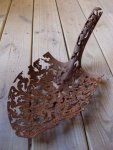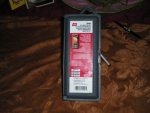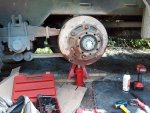Tried to beat the heat and humidity. But I bled the brakes, with a pressure bleeder. I now have 3/4 pedal, I think I may still have an air pocket in the lines somewhere. I did an air-pack rebuild recently, which I'm hoping solves my brake loss issue I had earlier this year. I have yet to find any leaks right now, so I'm hoping another quick bleed will give me all the pedal I used to have before. I've got only a couple days before the Weare military rally, hoping to have everything sorted out.Good luck hope it works out for you. I seen that rally was coming and was thinking that would be nice to goto I live up in conway so not far for me. I don't have tags on my truck yet. I could maybe get things ready in time but that would be tight maybe next next year.
-
Steel Soldiers now has a few new forums, read more about it at: New Munitions Forums!
What did you do to your deuce this week?
- Thread starter Seth_O
- Start date

More options
Who Replied?- 820
- 858
- 93
- Location
- W.WA
Car show today. My truck was the only truck/car you could climb in or otherwise touch. Probably at least 50 kids sat behind the wheel and at least 20+ adults.
![20190720_134717[1].jpg 20190720_134717[1].jpg](https://www.steelsoldiers.com/data/attachments/529/529145-3cdc9c85f02b2df5fb7ae95e89fa9cb1.jpg)
![20190720_133207[1].jpg 20190720_133207[1].jpg](https://www.steelsoldiers.com/data/attachments/529/529146-009a905c2ea67864af370798e3c1c081.jpg)
There was a bobbed deuce there as well, but I never saw the owner. I stood around in the sun for 7 hours and spoke to anyone that had any questions. SPF 100 to the rescue!
![20190720_134717[1].jpg 20190720_134717[1].jpg](https://www.steelsoldiers.com/data/attachments/529/529145-3cdc9c85f02b2df5fb7ae95e89fa9cb1.jpg)
![20190720_133207[1].jpg 20190720_133207[1].jpg](https://www.steelsoldiers.com/data/attachments/529/529146-009a905c2ea67864af370798e3c1c081.jpg)
There was a bobbed deuce there as well, but I never saw the owner. I stood around in the sun for 7 hours and spoke to anyone that had any questions. SPF 100 to the rescue!
Some fellas get a bit upset when you do that.Maybe the little guy (bob)was a orphan you should have took him home with you
Another Ahab
Well-known member
- 18,141
- 4,945
- 113
- Location
- Alexandria, VA
Last edited:
- 18,635
- 6,326
- 113
Congrats on being the ONE TRUCK at a Touch-A-Truck event/Car Show that folks could actually experience that addicting "hands-on" sampling.Car show today. My truck was the only truck/car you could climb in or otherwise touch. Probably at least 50 kids sat behind the wheel and at least 20+ adults.
View attachment 771099View attachment 771100
There was a bobbed deuce there as well, but I never saw the owner. I stood around in the sun for 7 hours and spoke to anyone that had any questions. SPF 100 to the rescue!

Hmmm... "Finders keepers"?!?!? Did you look to see if the keys were in it?Maybe the little guy (bob)was a orphan you should have took him home with you


... but, but.Some fellas get a bit upset when you do that.



Another Ahab
Well-known member
- 18,141
- 4,945
- 113
- Location
- Alexandria, VA
77 AMG
Active member
- 403
- 62
- 28
- Location
- Owingsville, KY
*Somebody* is very creative with WAY too much time available. Nice work, though.
You know they make shovels just like that for working in water people pay good money for them.
- 6,425
- 4,990
- 113
- Location
- Ft. Lauderdale, Florida
I don't do tap a whatever but.....................Tried to beat the heat and humidity. But I bled the brakes, with a pressure bleeder. I now have 3/4 pedal, I think I may still have an air pocket in the lines somewhere. I did an air-pack rebuild recently, which I'm hoping solves my brake loss issue I had earlier this year. I have yet to find any leaks right now, so I'm hoping another quick bleed will give me all the pedal I used to have before. I've got only a couple days before the Weare military rally, hoping to have everything sorted out.
Sent from my SM-S920L using Tapatalk
Hook up service air (any an compressor your may have) at 100psig or so to the right hand rear gladhand with the truck OFF..................very quite.
Have somebody operate the brakes a whole bunch.
Now one gets to crawl around a bunch.......... Enjoy
One may find any air or hydraulic leak that way.
- 6,425
- 4,990
- 113
- Location
- Ft. Lauderdale, Florida
Me and Dog know it is much cooler under truck.
He waiting for whatever.
Me searching what to fix next.
He waiting for whatever.
Me searching what to fix next.
- 6,425
- 4,990
- 113
- Location
- Ft. Lauderdale, Florida
duplicate and it is hot
FloridaAKM
Well-known member
- 2,699
- 395
- 83
- Location
- Gainesville, Florida
I had a low tire on the M-1082 & my old 88 Hilux Toyota & couldn't get a tank or compressor near it, so what it a guy to do? Fire up the Deuce & after she warms up, back her into position to feed air off of the Emergency glad hand to all the low tires via a hose I made up years ago. While checking out the glad hand connection, it was noted that it leaked a little before hooking up. After completing the filling, a few operating cycles of the shutoff handle stopped the slight leakage.....one more issue fix that was unknown before. The LMTV has dryer air, but the Deuce needed running.
Afterwards, I had to go for a drive in the Deuce since she hasn't been anywhere off the property for a while. Driving down the sand/limerock road was no fun since the last few storms have washed out gullies across & down the sides of the roads; I picked a bad time due to it started raining & the truck traffic that was out for a Sunday drive. All in all it was a good day to use her again for more than a yard ornament. I did notice that a corner of the cab over the drivers area had the paint blown off & was leaking water from the rains into the truck. Other than welding a patch on, what is the best way to repair a perforated rusty corner?
Afterwards, I had to go for a drive in the Deuce since she hasn't been anywhere off the property for a while. Driving down the sand/limerock road was no fun since the last few storms have washed out gullies across & down the sides of the roads; I picked a bad time due to it started raining & the truck traffic that was out for a Sunday drive. All in all it was a good day to use her again for more than a yard ornament. I did notice that a corner of the cab over the drivers area had the paint blown off & was leaking water from the rains into the truck. Other than welding a patch on, what is the best way to repair a perforated rusty corner?
77 AMG
Active member
- 403
- 62
- 28
- Location
- Owingsville, KY
Handy tool set, that. I have been using the harbor Freight one for several years now. I love the "trade in" for broken driver tips.
WildEd
Member
- 47
- 38
- 18
- Location
- Corbin,KY/Poynor,TX
- 6,425
- 4,990
- 113
- Location
- Ft. Lauderdale, Florida
The earth is iron, it corrodes as earth was given an atmosphere.Thinking of putting a snorkle on mine at some point. Not for deep water but to keeping it out of snow in winter but then again I like to keep out of the salt. Image if they found something that worked with out the rust. Who invented rust anyway?
As to the human interaction with rust/corrosion .....................
Rust in History. The great Roman philosopher, Pliny, AD 23-79, wrote at length about ferrum corrumpitur, or spoiled iron, for by his time the Roman Empire had been established as the world's foremost civilization, a distinction due partly to the extensive use of iron for weaponry and other artifacts.
Pliny considered the rusting of iron to be a punishment of the gods, as the metal allows itself to be used for swords an other war purposes.
Rust in History
To the great majority of people, corrosion means rust, an almost universal object of hatred. `Rust' is, of course, the name which has more recently been specifically reserved for the corrosion of iron, while `corrosion' is the destructive phenomenon which affects almost all metals. Although iron was not the first metal used by man, it has certainly been the most used, and must have been one of the first with which serious corrosion problems were obtained. It is not, therefore, surprising that the terms corrosion and rust are almost synonymous. (reference)
The great Roman philosopher, Pliny, AD 23-79, wrote at length about ferrum corrumpitur, or spoiled iron, for by his time the Roman Empire had been established as the world's foremost civilization, a distinction due partly to the extensive use of iron for weaponry and other artifacts.
To the fighters of old, rust was something of a mixed blessing. In the eleventh century, a Norman knight, William de Lacey, lost his way during a hunting expedition into the thickly wooded and swampy Vale of Ewas, in Wales. He came across the remains of St David's hermitage whereupon, overcome by an urge to mend his sinful ways, he decided to dedicate the remainder of his days to religious contemplation and rebuilding the chapel. Legend has it that he never for the rest of his life removed his armor. (image courtesy)
One explanation for this strange behavior was that it was a self-imposed penance. More likely, however, is that he was prevented from doing so because of corrosion brought about by the dank atmosphere of the valley. Corrosion of arms and armor has also been advantageous. The techniques of bluing and gilding were frequently used to protect steel objects, for, it was found that the application of a variety of heat treatments created highly protective films of oxide . These, with skill, could turn functional weaponry into beautiful works of art.
The Romans must have been vexed by the susceptibility of iron to rust, for, in true scientific fashion, Pliny asked himself the question: why should iron corrode more easily than other metals? Lacking the ability to investigate the problem experimentally, he arrived at the metaphysical solution that it is because iron is both the best and the worst of man's servants. Although very useful domestically, it is also the metal of war, slaughter and brigandage. Writing about iron arrows, Pliny said,
It is a great evil that to enable death to reach human beings more quickly we have taught iron how to fly.
He believed that the nuisance of corrosion compensates for the advantages of the metal because, the same benevolence of nature has limited the power of iron by inflicting on it the penalty of rust, and the same foresight has made nothing in the world more mortal than that which is most hostile to mortality.
In other words, Pliny considered the rusting of iron to be a punishment of the gods, as the metal allows itself to be used for swords an other war purposes.
A remarkable consequence of his philosophy was the technique of corrosion control by religious ceremony. He recorded that this had been used to protect the chains of a suspension bridge built for Alexander the Great, but Pliny was sceptical because the method had failed on previous occasions.
JB Weld or epoxy and some strips of canvas (or glass cloth) might work.. Other than welding a patch on, what is the best way to repair a perforated rusty corner?
- 114,300members
- 167,192threads
- 2,353,761posts
- 4,420online users








